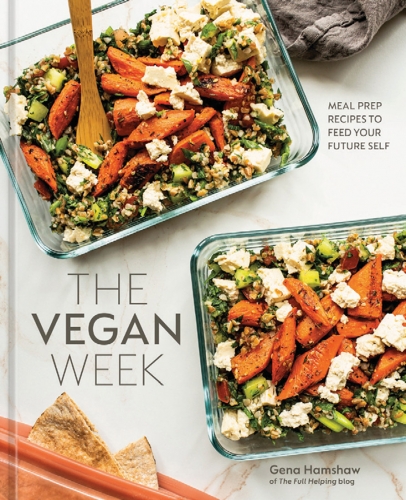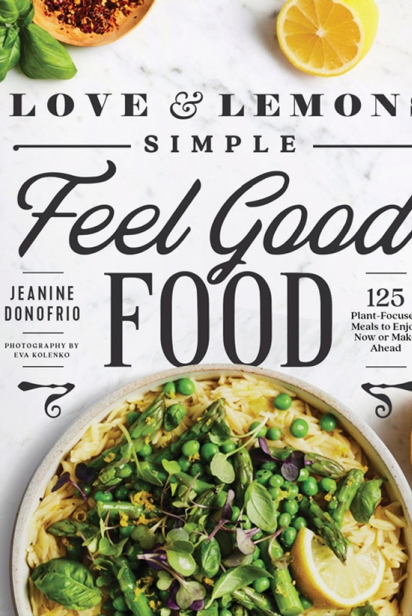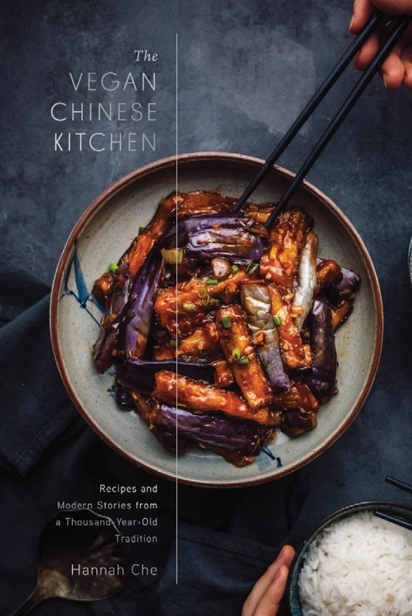Three Plant-Based Cookbooks Make Life in the Kitchen Easier
The Vegan Week: Meal Prep Recipes to Feed Your Future Self
BY GENA HAMSHAW (Ten Speed Press, 2022)
GENA HAMSHAW CUTS to the chase in the introduction of The Vegan Week: “For me, getting dinner on the table is rarely effortless. I get overwhelmed easily and become discouraged when recipes go awry.”
And just like that, the New York City registered dietician and nutritionist, recipe developer, author and The Full Helping blogger emerges more friendly than intimidating, breaking down any barriers that might have intimidated readers. There’s no shame in needing a plan.
Hamshaw starts by walking readers through four suggestions for successful make-ahead cooking: Be kind to your future self; have a (flexible) plan; remember variety; and prioritize. She explores nutrition and the steps of how to effectively plan ahead with hints about shopping, vegetable prep and cooking, how to stock your pantry and even storage and reheating suggestions. A glossary helps novices learn about aquafaba, Bragg Liquid Aminos and vital wheat gluten.
Hamshaw’s chapters are organized by purpose: “Protein,” with recipes like balsamic tempeh and seitan, and “Vegetables and Starches,” which she says “work well as side dishes [but] they can also serve as the building blocks of a vegan bowl.” Other chapters include “Sauces, Spreads, Dressings & Dips”— with a Cheddar Cheesy Sauce, Tangy Cashew Cream, and Romesco, among other sauces—and then, halfway through the book, Hamshaw launches into the “Breakfasts,” “Snacks,” “Bowls & Lunch Boxes,” and finally “Stovetop Meals” and “Oven Meals,” reminding readers that these are meals that will be prepped and ready to be finished later, sometimes even at work.
“My enthusiasm for cooking will probably always wax and wane, but thanks to the habit of meal prep, I manage to cook and eat well even when I’m resistant or unmotivated.”
The Vegan Chinese Kitchen: Recipes and Modern Stories from a Thousand-Year-Old Tradition
BY HANNAH CHE (Clarkson Potter, 2022)
FOR MANY, becoming vegan, or even adopting a vegetarian or plant-based diet, can include an emotionally painful separation from cultural traditions that include meat-based dishes. Hannah Che opens The Vegan Chinese Kitchen examining just that.
“I wondered if my commitment to eat more sustainably meant I was turning away from my culture,” Che writes in her introduction. “It’s impossible to separate who we are from what we eat, and animal products are deeply ingrained in the food traditions of most cultures.”
Then she learned about zhai cai: “the plant-based Chinese cuisine that emphasizes umami-rich ingredients and can be traced back over centuries to Buddhist temple kitchens.”
Che was born and raised in Detroit, before embarking on an exploration of her heritage in China, living with family there for years and later training as a chef at Guangzhou Vegetarian Culinary School. She discovered that vegetarian and vegan cooking “is its own cuisine in China, a rich tradition that had existed for more than 2,000 years, motivated by the Buddhist tenets of compassionate eating.”
Now based in Portland, Oregon, Che is a writer, photographer—the book’s beautiful moody images are all hers—and creator of The Plant-Based Wok blog. While the cookbook feeds readers’ desires for “veganized versions of familiar Chinese dishes made with meat, like kung pao chicken and mapo tofu,” Che challenges that it’s also “inventive, satisfying and delicious in its own right.”
She familiarizes readers with traditional Chinese ingredients, including how to prepare aromatics and herbs, and lists basic equipment such as a wok and wok tools—and even explains how to properly season a wok, a clay pot and skimmer. She then dives into how to use the cookbook, complete with a breakdown of the different terms to denote dietary distinctions, from more commonly used terms like ovo-lacto vegetarian and vegan to side-of-the-pot vegetarians.
It’s as much a history book as it is a cookbook, covering “The History of Vegetarian Eating in China” before diving into “Leafy Greens” recipes, like Blanched Spinach with Sesame Sauce; Blanched Lettuce with Ginger Soy Sauce; Napa Cabbage & Vermicelli Salad; and Blanched Asparagus with Sizzling Oil. Other chapter topics are “Stem, Shoots & Flowers,” “Beans, Fruits & Gourds,” “Root Vegetables,” “Tofu”— including recipes for Sweet and Sour Tofu and Stir-Fried Water Spinach with Fermented Tofu, to name a few.
Love & Lemons Simple Feel Good Food: 125 Plant- Focused Meals to Enjoy Now or Make Ahead
BY JEANINE DONOFRIO (Avery, 2023)
SIMPLE. FLAVORFUL. NOURISHING.
Those words sum up author Jeanine Donofrio’s “veggie-first approach to recipes” in her third cookbook Love & Lemons Simple Feel Good Food.
From the introduction, Donofrio makes clear her commitment to accessible recipes. She asks readers if they’re an at-the-ready cook, who is interested in recipes that take roughly 45 minutes or less, or an in-advance cook, who seeks recipes with components that can be made ahead and frozen to be reheated at a later date. “No worries: There isn’t one best way to get dinner on the table,” she writes.
“Either way, the recipes in this book will help you simplify the process of day-to-day cooking. You’ll learn how to minimize time at the grocery store, utilize pantry ingredients, and overall, become more efficient in the kitchen,” Donofrio writes.
The 125 recipes included are seasonal, fun, satisfying and built around vegetables. From breakfast dishes like a skillet granola to lunching on a Lentil Salad with Green Tahini or exploring the multitude of One-Pot or Feel-Good Soups or main dishes such as Broccoli Steaks or Sheet Pan Tofu Kimchi Lettuce Wraps, options that can tempt vegans and omnivores alike. Their uncomplicated nature makes the recipes approachable to even a novice cook, especially when it comes to inviting readers to treat themselves to one of the desserts, including the fittingly versatile Freezer Fudge, Four Ways.
Donofrio credits her mom’s genius at always having a frozen lasagna in reserve, along with a nod to how the Love & Lemons community embraces adapting recipes: “You’ve taught me that we all share a goal: to eat fresh, healthy, and delicious food,” even if cooks arrive at their finished product differently.
“Before I decide what to cook, I check my fridge to see what vegetables I have on hand. Then, I build from there. A broccoli grain bowl with a tasty sauce? Sweet potato veggie burgers with curry spices and paneer? This veggie-first approach sparks my creativity and guarantees that I’m eating plenty of vegetables, both of which make me feel good!”






